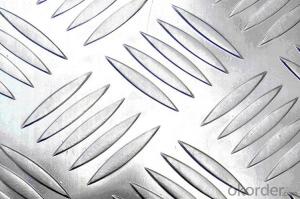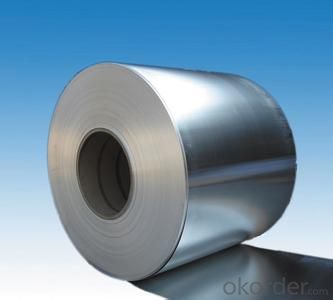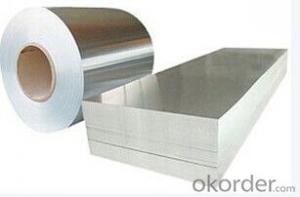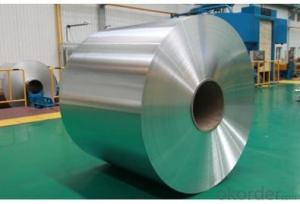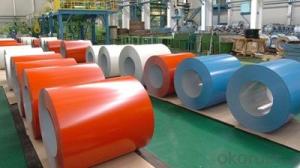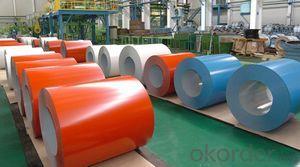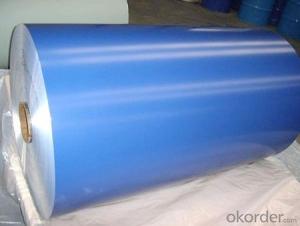Ruud Air Conditioner Aluminum Coil - Small Five Bar AA1100 Aluminium Coils
- Loading Port:
- China Main Port
- Payment Terms:
- TT or LC
- Min Order Qty:
- -
- Supply Capability:
- -
OKorder Service Pledge
OKorder Financial Service
You Might Also Like
1.Structure of Five Bar Aluminium Coils Description
Five Bar Aluminium Coils is one semi-finished aluminium material. This strip can be rolled down to aluminium coil,sheet,circle ect. The alloy AA1050 is widly used in building, industry ect. Its weight is much lower than steel. So many customers choosed aluminium material instead of steel.
2. Main features of the product
a.Competitive price---We have our own mills and can produce mill finished aluminium coils, so we can control the production cost better.
b.Professional after-sale service---We have more than 15 years exportation experience and you need not worry about the exporation problems.
c.Fast delivery time---We can control the delivery time within 35 days.
3. Image
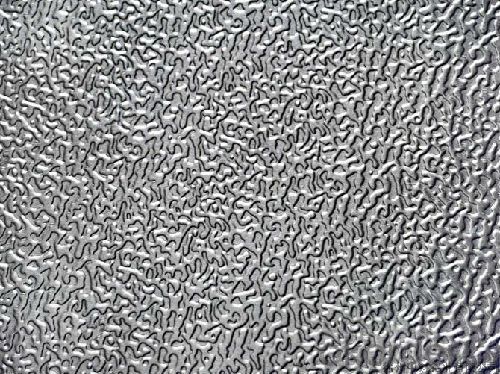
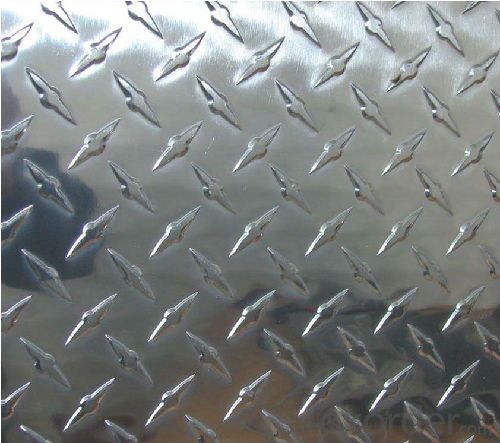
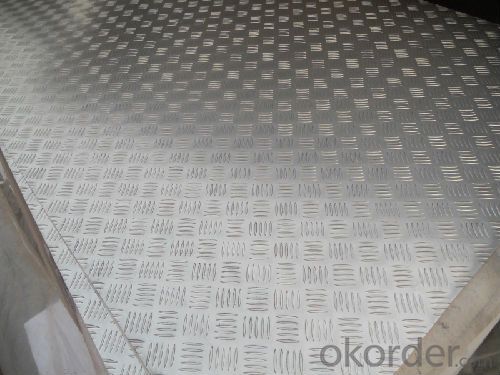
4.Products Specification
| Alloy | Temper | Embossed | Coil ID | Coil Weight |
| AA1100 | H18 | Stucco | 505mm | 2-2.5 tons |
5.FAQ:
What is the quality standard?
---Usually our standard is GB3880-2006
What is the largest width?
---It is 2300mm
What is the MOQ?
---Usually we can accept 80 tons.
- Q: Explain how the use of aluminum coils impacts the welding speed and efficiency.
- <p>Aluminum coils can significantly affect welding speed and efficiency due to their thermal conductivity and melting point. Aluminum's high thermal conductivity means it dissipates heat quickly, which can slow down the welding process as more energy is required to maintain the necessary heat for fusion. Additionally, aluminum's lower melting point compared to steel can lead to faster melting, potentially increasing welding speed but also requiring more precise control to prevent overheating and defects. The use of aluminum coils can also influence efficiency through the type of welding process used; for example, TIG welding is often preferred for aluminum due to its ability to provide precise heat control, which can enhance both speed and quality of the weld.</p>
- Q: What maintenance is required for aluminum coils?
- Maintenance for aluminum coils typically includes regular cleaning and inspection to ensure efficient performance and longevity. Here are some specific maintenance requirements for aluminum coils: 1. Cleaning: Regularly clean the aluminum coils to remove dirt, dust, and debris that can accumulate on the surface. Use a soft brush or a vacuum cleaner with a brush attachment to gently remove any loose particles. Avoid using abrasive cleaners or brushes that can scratch or damage the surface of the aluminum. 2. Inspection: Periodically inspect the aluminum coils for signs of damage or wear. Check for any bent or dented fins, which can restrict airflow and reduce the coils' efficiency. Look for signs of corrosion, such as discoloration or pitting, as this can affect the coils' performance and lifespan. 3. Coil Protection: Apply a protective coating or sealant to the aluminum coils to prevent corrosion and damage from exposure to moisture, chemicals, or harsh environmental conditions. This can help prolong the life of the coils and maintain their performance. 4. Lubrication: If your aluminum coils are part of a mechanical system, such as an HVAC unit, ensure that any moving parts are properly lubricated. This can help reduce friction and wear on the coils, improving their efficiency and preventing premature failure. 5. Professional Maintenance: Consider scheduling regular professional maintenance for your aluminum coils, especially if they are part of a larger system. HVAC technicians or specialized coil cleaning services can provide a thorough inspection, cleaning, and maintenance to ensure optimal performance and identify any potential issues early on. By following these maintenance practices, you can help extend the lifespan of your aluminum coils, improve their efficiency, and prevent costly repairs or replacements.
- Q: What is the typical thermal conductivity of aluminum coils?
- Aluminum coils typically exhibit a thermal conductivity ranging from 205 to 220 W/mK. Renowned for its exceptional thermal conductivity, aluminum stands as a favored option for heat transfer purposes, notably within HVAC systems, refrigeration units, and heat exchangers. The remarkable thermal conductivity of aluminum facilitates effective dissipation and transfer of heat, thereby guaranteeing peak performance and energy efficiency in said systems.
- Q: Are aluminum coils easy to install?
- Yes, aluminum coils are generally easy to install. They are lightweight and flexible, which makes them easier to handle and maneuver during installation. They can be easily cut and shaped to fit the specific requirements of the installation, and they are often available in pre-cut sizes, further simplifying the installation process. Additionally, aluminum coils are typically designed with features such as interlocking edges or snap-on connectors, which make it easier to join multiple coils together or connect them to other components. Overall, with the right tools and basic knowledge of HVAC installation, aluminum coils can be installed relatively easily.
- Q: How do aluminum coils contribute to increased structural stability?
- Aluminum coils contribute to increased structural stability due to their high strength-to-weight ratio. The use of aluminum coils provides structural reinforcement, allowing for greater load-bearing capacity while keeping the overall weight of the structure relatively low. This enhanced stability is crucial in various applications, such as construction, transportation, and manufacturing, where durability and structural integrity are paramount.
- Q: Can aluminum coils be used in electrical transmission systems?
- Aluminum coils have the ability to be utilized in electrical transmission systems. The utilization of aluminum is prevalent in electrical transmission systems due to its advantageous electrical conductivity, high strength-to-weight ratio, and cost-effectiveness in comparison to other materials like copper. Transformers, motors, generators, and other electrical devices benefit from the application of aluminum coils. Additionally, aluminum coils possess the advantage of being lightweight, simplifying their handling and installation in transmission systems. It is important, however, to take into account that aluminum has lower electrical conductivity than copper, necessitating larger cross-sectional areas to achieve the same electrical performance. To maintain efficiency, reliability, and safety, it is crucial to adhere to proper design and engineering practices when sizing and connecting aluminum coils in electrical transmission systems.
- Q: Im trying to make a aluminum ring. I want it to be rock hard. PLZZAnswers that work get best answer
- use a hard alloy like 7075 and heat treat it
- Q: How do aluminum coils compare to other non-ferrous metals like titanium?
- Aluminum coils are generally lighter, more affordable, and easier to work with compared to non-ferrous metals like titanium. However, titanium possesses superior strength, corrosion resistance, and heat resistance properties, making it a preferred choice for applications requiring high performance and durability.
- Q: How are aluminum coils protected against corrosion during storage?
- Aluminum coils are protected against corrosion during storage through various methods such as applying a protective coating, using desiccants or moisture-absorbing materials, ensuring proper ventilation, and storing them in a dry and controlled environment to prevent exposure to moisture and other corrosive elements.
- Q: I have completely disassembled my aluminum bass boat and it is being sandblasted.I am restoring the boat and will be giving it a new paint job.What do you recommend in the way of primer,paint or anything else I need to know.I just don,t want to mess it up by using the wrong thing.Best answer gets a fishing trip in the same boat we are talking about. If you can make it here I will put you on some fish.Catfish,bream,crappie,bass or even saltwater fish.
- Contact the manufacture and see what they used as it held up for quite a few yrs. Primer for aluminum is the beginning.
Send your message to us
Ruud Air Conditioner Aluminum Coil - Small Five Bar AA1100 Aluminium Coils
- Loading Port:
- China Main Port
- Payment Terms:
- TT or LC
- Min Order Qty:
- -
- Supply Capability:
- -
OKorder Service Pledge
OKorder Financial Service
Similar products
Hot products
Hot Searches
Related keywords
